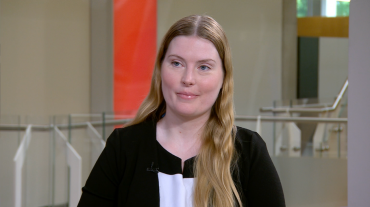
Expert Comment: What might President Trump’s second term mean for the world?
Dr Laura Smith, a specialist in American presidential history in the Faculty of History, explores the domestic and international implications of an inauguration that reflected the intersection of wealth and power in modern America.
In the lead up to his second term, we’ve seen more centrist or working-class Democrats shift to Trump’s side - those from regions still referred to as the Rust Belt. Despite concerns over the future of the economy, and despite making issues like the price of groceries central to his re-election campaign, Trump did not address these topics in his inaugural address. Certainly, there were no representatives of those groups in attendance.

Instead, it was filled with the world's richest men. Those who have built their policies around issues like student debt, such as Elizabeth Warren or Bernie Sanders, really picked up on that contrast: the idea of exclusivity, the notion of buying access to power.
Of course, one could argue that logistical constraints played a role - limited seating in the Capitol due to weather - but that doesn't explain why tech billionaires were seated in front of key cabinet members. There was a clear prioritisation of keeping people with power and wealth on Trump’s side.
While the likes of Elon Musk can't just walk into the Oval Office the way he might at Mar-a-Lago, this is the Trump White House - last time, people who had never set foot in government were suddenly influential players.
Global leaders will face significant challenges in navigating Trump’s second term. The unpredictability of his administration affects key global issues, from climate change to technology. Even during Biden’s administration, the withdrawal from Afghanistan angered European allies but they had no choice but to adjust. With Trump, that unpredictability is magnified. Global leaders must prepare for abrupt decisions with little consultation.
Trump’s first term had a significant impact on America’s global standing. Even among international leaders who were supportive of a second Biden term or a potential Harris administration, there has been a pragmatic shift and acknowledgement of a new reality. They realise that Trump’s second term means they have to take him seriously in a way they might not have during his first term.
The first time around, Trump’s victory could have been dismissed as a fluke; he didn’t win the popular vote and had no prior political experience. But this time, he has returned to power with renewed confidence and that says something significant about the American electorate.
Internationally, there is now an understanding that U.S. domestic divisions are not just racial but also deeply gendered and economic. Foreign leaders now have to consider how to work with a deeply divided America. They may have dismissed Trump’s rhetoric before, but now they recognise that what may sound absurd to them resonates deeply with a significant portion of the U.S. population.
A historical parallel might be George W. Bush, who was perceived very differently domestically versus internationally. Post-9/11, American media depicted him as strong and decisive, while foreign outlets focused on images of him appearing uncertain and overwhelmed. Similarly, Trump is seen by his base as a strongman but by much of the world as unpredictable and divisive.
Trump clearly resonates with a portion of the electorate. Some argue that his ability to tap into public sentiment makes him politically savvy, but that’s not necessarily the case. He does have a cult of personality and an ability to hold grudges, which may help him stay relevant.
His rhetoric about “making America great again” reflects a nostalgia for a past that was only beneficial to a select group - namely, white men. The Harris campaign pointed out that his vision for America is one that excludes many people. Some even argue that America was never truly “great” in the way he envisions, as its very foundation is about striving towards a more perfect union rather than returning to an idealised past.
Yet unlike other politicians of the same age - such as Bill Clinton or George W. Bush - Trump does not seem interested in adapting to modern realities. His inaugural address was deeply backward-looking. Even Reagan-era conservatives recognised that the world moves forward; Trump is unique in his attempt to pull it back.
Trump’s leadership has been described as divisive within the U.S., and these domestic divisions could impact America's global role. If a leader’s rhetoric does not align with the expectations of a modern global leader, it shapes how America is perceived internationally. For instance, Trump’s attitude towards Mexico - symbolised by his references to building a wall - has reinforced divisions both at home and abroad.
This isn’t new. During the Cold War, Soviet propaganda used America’s civil rights struggles to highlight domestic unrest and racial injustice. Domestic divisions have always had an impact on foreign policy, and Trump's rhetoric amplifies that.
Global leaders will face significant challenges in navigating Trump’s second term. The unpredictability of his administration affects key global issues, from climate change to technology. Even during Biden’s administration, the withdrawal from Afghanistan angered European allies but they had no choice but to adjust. With Trump, that unpredictability is magnified. Global leaders must prepare for abrupt decisions with little consultation.
They will also need to assess whether traditional alliances hold. Trump has demonstrated a willingness to break with convention, such as meeting with Kim Jong-un. Global leaders must balance their national interests while knowing they cannot always rely on traditional U.S. foreign policy norms.
Ultimately, Trump is now more politically powerful than ever. That reality will shape how other nations engage with the U.S. over the next four years.
 New analysis of archaeological data reveals how agriculture and governance have shaped wealth inequality
New analysis of archaeological data reveals how agriculture and governance have shaped wealth inequality
 Cambridge victorious in Women's and Men's Boat Races 2025
Cambridge victorious in Women's and Men's Boat Races 2025
 Expert Comment: Ethical and legal challenges of uterus transplants in Mexico
Expert Comment: Ethical and legal challenges of uterus transplants in Mexico
 Expert Comment: How is generative AI transforming the labour market?
Expert Comment: How is generative AI transforming the labour market?
 Expert comment: Why are people in the UK leaving it so late to have children?
Expert comment: Why are people in the UK leaving it so late to have children?
 Expert Comment: How history will look back on Russian invasion
Expert Comment: How history will look back on Russian invasion